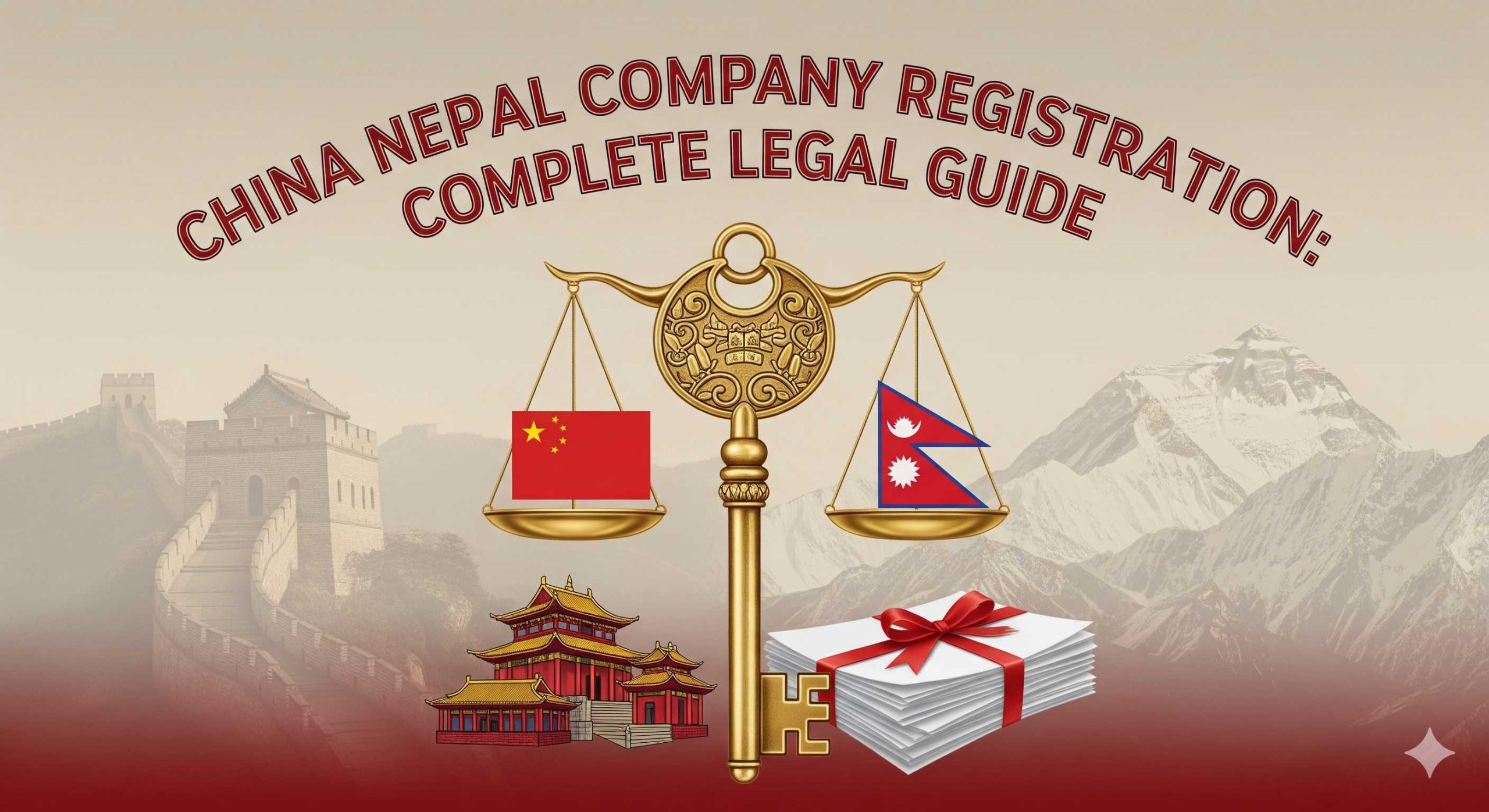Table of Contents
Introduction
China Nepal company registration has become increasingly vital as bilateral trade strengthens between these nations. Chinese businesses are establishing their presence in Nepal through various legal structures, making this process essential for cross-border expansion.
The China Nepal company registration process involves specific legal procedures that must be followed meticulously. Furthermore, understanding Nepal’s regulatory framework ensures successful business establishment for Chinese enterprises.
What is China Nepal Company Registration?
China Nepal company registration refers to the legal process whereby Chinese companies establish their business operations in Nepal. This process involves registering either as a foreign company branch office, liaison office, or incorporating a new Nepali company with Chinese investment.
Additionally, the registration process ensures compliance with both countries’ regulations. Moreover, it provides legal recognition for business operations within Nepal’s jurisdiction.
Where Can China Nepal Company Registration Be Done?
The China Nepal company registration process is primarily handled through:
- Office of Company Registrar (OCR) – Main registration authority
- Department of Industry (DOI) – Foreign investment approval
- Nepal Rastra Bank – Financial clearances
- Investment Board Nepal (IBN) – Large-scale investments
Types of Company Registration Options
1. Branch Office Registration
As per Section 154 (1) of the Nepalese Companies Act, 2006, no foreign company can carry out its business transaction in Nepal without registering its branch company in Nepal. This structure allows Chinese companies to operate as extensions of their parent company.
Key Features:
- No separate legal entity
- Activities limited to parent company objectives
- Direct control from Chinese headquarters
2. Liaison Office Registration
Liaison offices serve as representative offices for foreign companies. These offices facilitate business development and market research activities.
Key Features:
- Cannot engage in profit-making activities
- Limited to liaison and promotional work
- Lower compliance requirements
3. Private Limited Company
Chinese investors can establish a new Nepali company through equity participation. For a private limited company, the minimum capital is NPR 100,000.
Legal Requirements for China Nepal Company Registration
Document Requirements
| Document Type | Chinese Company | Nepali Registration |
|---|---|---|
| Certificate of Incorporation | Original + Translation | Required |
| Board Resolution | Notarized Copy | Mandatory |
| Memorandum & Articles | Certified Translation | Essential |
| Financial Statements | Last 3 Years | Required |
| Bank Solvency Certificate | From Chinese Bank | Mandatory |
Capital Requirements
| Company Type | Minimum Capital | Timeline |
|---|---|---|
| Branch Office | As per parent company | 30-45 days |
| Liaison Office | NPR 500,000 | 20-30 days |
| Private Limited | NPR 100,000 | 7-15 days |
Step-by-Step Registration Process
Phase 1: Pre-Registration Approval
Step 1: Department of Industry Approval
When establishing a business in Nepal as a branch office, representatives of the foreign company must obtain approval from the Department of Industry and Nepal Rastra Bank.
Required documents include:
- Application form
- Company profile
- Project proposal
- Environmental compliance certificate
Step 2: Nepal Rastra Bank Clearance
Foreign exchange approval is mandatory for:
- Capital transfer
- Profit repatriation
- Loan arrangements
- Foreign currency transactions
Phase 2: Company Registration
Step 1: Name Reservation
Submit three alternative company names to OCR. The approval process takes 2-3 working days typically.
Step 2: Document Preparation
Prepare all required documents with proper translation and notarization. Ensure all Chinese documents are translated by certified translators.
Step 3: Registration Filing
The timeline for registration of a branch office in Nepal is usually 30 to 45 days. Submit complete documentation to OCR with prescribed fees.
Phase 3: Post-Registration Compliance
Step 1: PAN Registration
Obtain a Permanent Account Number (PAN) from the Inland Revenue Department within 30 days of registration.
Step 2: VAT Registration
Register for Value Added Tax (VAT) if your annual turnover exceeds NPR 5 million
Investment Procedures for Large-Scale Projects
Investment Board Nepal (IBN)
For investments exceeding NPR 6 billion (approximately USD 50 million), submit an application to the Investment Board Nepal (IBN) for approval.
IBN Benefits:
- Single window clearance
- Fast-track approval
- Investment incentives
- Streamlined procedures
Department of Industry (DOI)
If the foreign investment is of fixed assets up to five hundred million, then approval of Department of Industry is required
Common Challenges and Solutions
Challenge 1: Documentation Complexity
Solution: Engage local legal counsel specializing in China Nepal company registration. Professional assistance ensures proper documentation and reduces processing delays.
Challenge 2: Regulatory Compliance
Solution: Maintain regular compliance monitoring. Establish internal systems for ongoing regulatory adherence.
Challenge 3: Cultural and Language Barriers
Solution: Partner with experienced local firms. Cultural understanding accelerates the registration process significantly.
Cost Analysis
Registration Fees Structure
| Service | Government Fee (NPR) | Professional Fee (NPR) |
|---|---|---|
| Branch Office | 15,000-25,000 | 50,000-80,000 |
| Liaison Office | 10,000-15,000 | 30,000-50,000 |
| Private Limited | 5,000-10,000 | 25,000-40,000 |
Additional Costs
- Translation services: NPR 500-1,000 per page
- Notarization: NPR 100-500 per document
- Legal consultation: NPR 2,000-5,000 per hour
- Government liaison: NPR 20,000-40,000
Timeline Expectations
Typical Processing Periods
Branch Office Registration:
- DOI Approval: 15-20 days
- NRB Clearance: 10-15 days
- OCR Registration: 30-45 days
- Total Timeline: 60-90 days
Liaison Office Registration:
- DOI Approval: 10-15 days
- OCR Registration: 20-30 days
- Total Timeline: 30-45 days
Key Success Factors
1. Proper Documentation
Complete and accurate documentation prevents delays. Furthermore, certified translations ensure regulatory compliance.
2. Professional Guidance
Experienced legal counsel expedites the process. Additionally, local expertise navigates regulatory complexities effectively.
3. Compliance Monitoring
Ongoing compliance ensures uninterrupted operations. Moreover, regular updates prevent regulatory violations.
Recent Regulatory Updates (2025)
Enhanced Digital Processing
Nepal has introduced online application systems for foreign company registration. Consequently, processing times have reduced by 20-30%.
Simplified Procedures
New guidelines streamline the China Nepal company registration process. Furthermore, single-window clearances improve efficiency.
Investment Incentives
Recent policy changes offer additional incentives for Chinese investors. Moreover, strategic sector investments receive preferential treatment.
Frequently Asked Questions
What is the minimum investment required for China Nepal company registration?
The minimum investment varies by company type. Branch offices require capital equivalent to parent company requirements, while liaison offices need NPR 500,000 minimum.
Where should Chinese companies begin the registration process?
Chinese companies should start with the Department of Industry for foreign investment approval. Subsequently, proceed to the Office of Company Registrar for actual registration.
How long does the China Nepal company registration process take?
The complete process typically takes 60-90 days for branch offices and 30-45 days for liaison offices, depending on documentation completeness.
What are the ongoing compliance requirements?
Registered companies must maintain annual filing requirements, tax compliance, and regulatory reporting. Additionally, foreign exchange compliance is mandatory.
Strategic Considerations
Market Entry Strategy
China Nepal company registration serves as a gateway to South Asian markets. Nepal’s strategic location provides access to both Indian and Chinese markets.
Risk Management
Proper legal structure selection minimizes operational risks. Furthermore, compliance frameworks protect against regulatory penalties.
Growth Planning
Scalable registration structures accommodate future expansion. Moreover, flexible legal frameworks support evolving business needs.
Conclusion
China Nepal company registration requires careful planning and professional execution. The process involves multiple regulatory approvals, proper documentation, and ongoing compliance requirements.
Success depends on understanding legal frameworks, maintaining proper documentation, and engaging qualified local counsel. Furthermore, staying updated with regulatory changes ensures continued compliance.
Chinese businesses entering Nepal’s market through proper registration procedures position themselves for sustainable growth. The investment in professional legal guidance pays dividends through streamlined operations and regulatory compliance.




